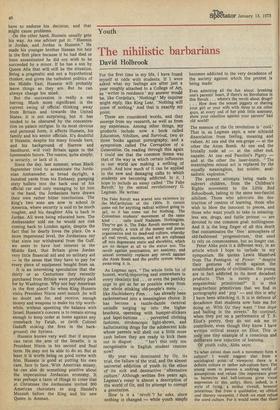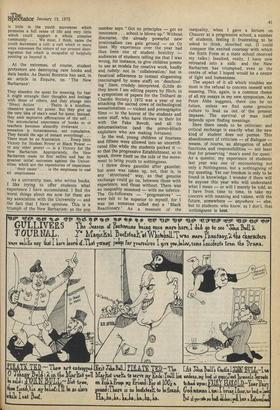Youth
The nihilistic barbarians
David Holbrook
For the first time in my life, I have found myself at odds with students. If I were asked what my feelings are after just a year roughly attached to a College of Art, as 'writer in residence' my answer would be, like Cordelia's, ' Nothing! ' My inquirer might reply, like King Lear, Nothing will come of nothing.' And that is exactly my point.
These are considered words, and they emerge from my research, as well as from my experience. Among other things, my products include now a book called Education, Nihilism, and Survival, two or three books against pornography, and a symposium called The Corruption of a Generation. On reading through this again I could see that the common theme was that of the way in which certain influences in our world are making a nothing of youth. And how much of it can be applied to the new and damaging cults to which students are becoming addicted. In it, I hope to include an essay called 'The Fake Revolt,' by the sexual revolutionary G. Legman. He writes: The Fake Revolt was scared into existence by the McCarthyism of the 1950s. It cannot come out for anything radical without going to jail, so it has come out for Nothing. The Colombian students' movement of the same kind . . . calls itself Nadaism. Nothingism. They've got it. The Fake Revolt movement is, very simply, a trick of the money and power organisation and its dead-end culture, whereby all real revolt, emotion, and art are siphoned off into degenerate static and showblitz, which are no danger at all to the status quo. The revolt against punctuation, art anatomy, and sexual normality replaces any revolt against the Atom Bomb and the profits system whose swan-song it is.
As Legman says, "The whole little bit of honest, world-improving zeal somewhere in every idealistic kid . . . or even the panicky urge to get is far as possible away from the whole stinking old-people's mess . . . like Huckleberry Finn. . . has already been racketeerised into a meaningless choice. It has become a razzle-dazzle carnival swindle surging up into the higher brackets, operating with bumper-stickers and lapel-buttons . . . perverted clothing fashions, stroboscopic light-shows, and hallucinating drugs for the adolescent kids whose parents will shell out a little more cash before they are ready to kick them out in disgust . . . "Isn't this only too recognisable in English student centres now?
My year was dominated by Oz, its trial, the failure of the trial, and the almost universal addiction of youth to the ethos of its sick and destructive 'alternative culture.' Although written five years ago, Legman's essay is almost a description of the world of Oz, and its attempt to corrupt a generation.
How is it a revolt '? he asks, since nothing is changed — while youth simply becomes addicted to the very decadence of the society against which the protest is being made: Even admitting all the fun about breaking one's parents' heart, if there's no Revolution in this Revolt . . . where's the revolt about drugs? . . . How does the sexual piggery or sharing your girl or your wife with three to six other guys, at every end of her pink little anatomy, show your rebellion against your parents' bad old world?
The essence of the Oz revolution is 'cool.' That is, as Legman says, a new schizoid dissociation from feeling, meaning and values. At one end the sex-grope — at the other the Atom Bomb. At one end the brutally nude ad — at the other end, napalm. At one end Pasolini's Pigsty — and at the other the laser-bomb. "The
meaningless sexual act is replaced by the equally meaningless, but noisier, analsadistic explosion."
The present attempts being made to subvert children, from the Children's Rights movement to the Little Red Schoolbook, belong to the same neo-fascist nihilism. Those who advocate the destruction of centres of learning, those will° wish to blow the innocent to pieces, and those who want youth to take to meaningless sex, drugs, and futile protest — are devoted to one common goal: nothingness. And it is the long finger of all this death that contaminates the 'free ' atmosphere of old-fashioned 'progressivism,' that used to rely on commonsense, but no longer can.
Peter Abbs puts it a different way, in an article which I hope to include in my symposium. He quotes Lewis Mumford from The Pentagon of Power: "despite their gestures of revolt against the established goods of civilisation, the young are in fact addicted to its most decadent products. This is surely a purely megatechnic primitivism?" It is this megatechnic primitivism that we find in pornography and ' pop ' — and this is why I have been attacking it. It is in defence of decadence that students now hate me for doing so. With Oz they want "free dope and balling in the streets." By contrast, when they put on a performance of T. S. Eliot's poetry, they do not ask me to contribute, even though they know I have written critical essays on Eliot. This is only one tiny example of a conscious and deliberate new rejection of learning.
Of youth cults, Abbs says: To what extent does such a movement form a culture? I would suggest that from a sociological point of viewpoint there is a definite culture or rather sub-culture here. The young seem to possess a unifying world of assumptions and values (the importance given to hairstyles and bell-bottoms gives visual expression to this unity). Here, indeed, is a style of living, a modus vivendi, however precarious. But from a qualitative, an ethical and literary viewpoint, I think we must ref use the word culture. For it would seem that there is little in the youth movement which promotes a full sense of life and very little which could support a whole complex community . . . We must, I think, name the youth movement a cult: a cult which in many ways expresses the nature of our present disintegration but which is incapable of helpfully pointing us beyond it.
At the extremes, of course, student protesters are destroying rare books and data banks. As Daniel Boorstin has said, in an article in Esquire, on 'The New Barbarians':
They abandon the quest for meaning, for fear it might entangle their thoughts and feelings with those of others, and they plunge into ' Direct Action ' . . Theirs is a mindless, obsessive quest for power. But they give up the very idea of man's need for quest. Instead, they seek explosive affirmations of the self... The accumulated experience of books or ot teachers becomes absurdly irrelevant . . sensation is instantaneous, not cumulative. They herald the age of instant everything! . . . There must be no frustration . . . Every little Victory for Student Power or Black Power — or any other power — is a Victory for the New Barbarism. Appropriately, the New Barbarism made its first sallies and has its greatest initial successes against the Universities, which are the repositories of experience . . . 'their cause' . . . is the emptiness to end all emptinesses . . .
As a university man, who writes books, I like trying to offer students what experience I have accumulated. I find the worst things about me now for them are my association with the University — and the fact that I have opinions. This is a triumph of the New Barbarism: as the pop number says "Got no principles — got no innocence . . . school is blown up." Without discourse, the already powerful new irrationalism can gain ground — on Oz lines. My experience over the year had thus been one of student hostility — audiences of students telling me that I was wrong, for instance, to give children poems to use as models for creative work, loudly and rudely: not in 'collaboration,' but in fanatical adherence to instant sloganising (encouraged by some staff) on ' deschooling ' lines, crudely interpreted. (Little do they know I am editing papers by Illich, in a symposium of papers for the Teilhard de Chardin Society.) 1972 was a year of me attacking the sacred cows of technological sensationalism — violent and pornographic films — to the horror of the students and some staff, who have thrown in their lot with the Fake Revolt, and all its dehumanisation (and the porno-kitsch exploiters who are making fortunes).
In the end, young children of fourteen and fifteen were allowed into an uncertificated film while the students packed it — so that the progressive Establishment, so to speak, threw itself on the side of the movement to bring youth to nothingness.
I threw down gauntlet after gauntlet: but none was taken up, not, that is, in any ' structured ' way, so that genuine exchange could go on, between those with experience, and those without. There was an inequality assumed — with me inferior. The Oz-followers — ' progressives ' — were felt to be superior to myself, for I was (as someone called me) a 'Black Reactionary.' As a measure of the inequality, when I gave a lecture on Chaucer at a progressive school, a number of students, feeling it frustrating to be asked to think, slouched out. (I could compare the excited courtesy with which the Sixth Form at a state school received my talks.) Insulted, really, I have now retreated into a sulk: and the New Barbarism has triumphed, even at the centre of what I hoped would be a centre of light and humanness.
The aspect of it all which troubles me most is the refusal to concern oneself with meaning. This, again, is a common theme of all my essays in my new symposium. As Peter A bbs suggests, there can be no future, unless we find some genuine culture to lead us out of the present impasse. The survival of man itself depends upon finding meanings.
Here there needs to be criticism: and critical exchange is exactly what the new kind of student does not pursue. This abandonment of criticism — of dialogue — means, of course, an abrogation of adult functions and responsibilities — not least that for preserving ' man's need for quest.' As a questor, my experience of students last year was one of encountering not only a Nothingness, but a nothingising of my questing. Yet our freedom is only to be found in knowledge. I wonder if there will be anyone this year who will understand what I mean — or will I merely be told, as I have from time to time, to take my concern with meaning and values, with the future, somewhere — anywhere — else, but to students: who know, as I don't, that nothingness is best.



































 Previous page
Previous page